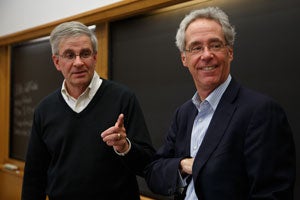In early November, David Shribman, the executive editor of the Pittsburgh Post-Gazette, sat down with his attorney, Fritz Byers ’81, before an audience at Harvard Law School, to discuss the relationships between journalists and their attorneys as they work together to tell interesting stories, publish the truth, provide a check on government and avoid liability.
Shribman calls Byers several times a week to ask him to glance over newspaper pages before they go to print or to get advice on whether publishing could put them in danger of losing a defamation suit. Byers told the audience that his job is to say yes as often as possible, and to help Shribman avoid lawsuits he can’t win.
“I define my job as finding a way for my clients to put into print anything that they want. I’ve never said, ‘I know you want to do this, but I’m not going to help you,'” Byers said.
Shribman noted that he had never gone against Byers’ advice—at least in part because he knew he would need him later down the line if the paper did get sued. But just as importantly, Shribman said, Byers and other lawyers can help prevent journalists from publishing problematic stories against their better judgment. “You wouldn’t want to be involved in any relationship whatsoever in which you didn’t have a check and a good conscience,” Shribman said.
